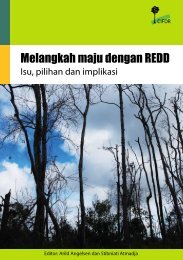Adaptive collaborative management of community forests in Asia ...
Adaptive collaborative management of community forests in Asia ...
Adaptive collaborative management of community forests in Asia ...
Create successful ePaper yourself
Turn your PDF publications into a flip-book with our unique Google optimized e-Paper software.
96 • Trikurnianti Kusumanto<br />
strategies, generally lack the feedback mechanisms that are necessary to<br />
<strong>in</strong>corporate new <strong>management</strong> <strong>in</strong>formation (e.g., the chang<strong>in</strong>g resource<br />
needs <strong>of</strong> local stakeholders) and adjust <strong>management</strong> to new conditions.<br />
Local people’s forest <strong>management</strong> systems, on the other hand, are to some<br />
extent responsive to local changes (e.g., people adopt shorter fallow periods<br />
if the population <strong>in</strong>creases) but are weak <strong>in</strong> respond<strong>in</strong>g to new demands (like<br />
assum<strong>in</strong>g greater decision-mak<strong>in</strong>g role under decentralisation) and rapid<br />
changes at wider levels (like those generated by economic globalisation).<br />
At the local level, because <strong>of</strong> recent social and economic pressures, earlier<br />
local systems <strong>of</strong> control and <strong>management</strong> have eroded and, where still<br />
existent, tend to be weak where forest resources are subject to compet<strong>in</strong>g<br />
claims (Wollenberg and Kartodihardjo 2002; Campbell 2002). They <strong>of</strong>ten<br />
lack legitimacy because local people are los<strong>in</strong>g trust <strong>in</strong> their local leaders,<br />
who are <strong>of</strong>ten accused <strong>of</strong> pursu<strong>in</strong>g their own <strong>in</strong>terests, or these systems lack<br />
<strong>of</strong>ficial support. As a consequence, the <strong>in</strong>ternal cohesion and legitimacy<br />
necessary to navigate complex and chang<strong>in</strong>g <strong>management</strong> situations is<br />
miss<strong>in</strong>g.<br />
Limits <strong>of</strong> current approaches<br />
Attempts to deal with the problems date to the early 1970s on Java and<br />
the mid-1980s on the other major islands. In response to the failure <strong>of</strong><br />
commercial extractive forestry <strong>in</strong> susta<strong>in</strong><strong>in</strong>g forest quality and people’s<br />
livelihoods and to the <strong>in</strong>creas<strong>in</strong>g conflicts between forestry projects and<br />
local communities, attention has progressively been paid by government,<br />
the <strong>in</strong>ternational donor <strong>community</strong> and nongovernmental organisations to<br />
participatory forestry activities. Indeed, the participation <strong>of</strong> local people <strong>in</strong><br />
forest <strong>management</strong> has been formally accepted as a fundamental basis for<br />
effective susta<strong>in</strong>able and equitable forest <strong>management</strong>.<br />
Nevertheless, despite almost four decades <strong>of</strong> people-oriented efforts,<br />
the unsusta<strong>in</strong>able and <strong>in</strong>equitable use <strong>of</strong> <strong>forests</strong> cont<strong>in</strong>ues unabated. We<br />
believe that the limited success <strong>of</strong> participatory <strong>in</strong>itiatives thus far is due<br />
to their <strong>in</strong>adequacy <strong>in</strong> address<strong>in</strong>g the two identified factors underly<strong>in</strong>g<br />
the problems: <strong>in</strong>compatible claims on <strong>forests</strong> and the <strong>in</strong>flexibility <strong>of</strong> most<br />
<strong>management</strong> systems to adapt to changes.
















